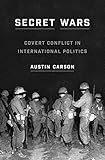Secret wars Book : covert conflict in international politics / Austin Carson.
Material type: TextSeries: Princeton studies in international history and politics | Princeton studies in international history and politicsDescription: xii, 325 pages : 24 cmISBN:
TextSeries: Princeton studies in international history and politics | Princeton studies in international history and politicsDescription: xii, 325 pages : 24 cmISBN: - 9780691181769 (hardback)
- 355.02
- 355.02
| Item type | Current library | Call number | Status | Date due | Barcode | Item holds |
|---|---|---|---|---|---|---|
 Books
Books
|
Junaid Zaidi Library, COMSATS University Islamabad 2nd Floor | 355.02 CAR-S 61897 (Browse shelf(Opens below)) | Available | 10001000061897 |
Browsing Junaid Zaidi Library, COMSATS University Islamabad shelves, Shelving location: 2nd Floor Close shelf browser (Hides shelf browser)

|

|

|

|

|

|

|
||
| 355.00973 POW-A Fabrication and application of nanomaterials / | 355.00973 VIN-U 61801 The United States of war a global history of America's endless conflicts, from Columbus to the Islamic State / | 355.02 AHM-T The thistle and the drone how america's war on terror became a global war on tribal islam / | 355.02 CAR-S 61897 Secret wars covert conflict in international politics / | 355.02 CHA-W War on Iraq | 355.02 CLA-O On war | 355.02 COK-C Can war be eliminated? / |
Secret Wars is the first book to systematically analyze the ways powerful states covertly participate in foreign wars, showing a recurring pattern of such behavior stretching from World War I to U.S.-occupied Iraq. Investigating what governments keep secret during wars and why, Austin Carson argues that leaders maintain the secrecy of state involvement as a response to the persistent concern of limiting war. Keeping interventions "backstage" helps control escalation dynamics, insulating leaders from domestic pressures while communicating their interest in keeping a war contained. Carson shows that covert interventions can help control escalation, but they are almost always detected by other major powers. However, the shared value of limiting war can lead adversaries to keep secret the interventions they detect, as when American leaders concealed clashes with Soviet pilots during the Korean War. Escalation concerns can also cause leaders to ignore covert interventions that have become an open secret. From Nazi Germany's role in the Spanish Civil War to American covert operations during the Vietnam War, Carson presents new insights about some of the most influential conflicts of the twentieth century. Parting the curtain on the secret side of modern war, Secret Wars provides important lessons about how rival state powers collude and compete, and the ways in which they avoid outright military confrontations
All


There are no comments on this title.